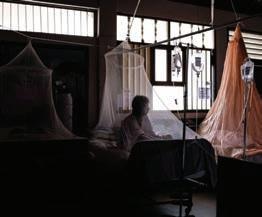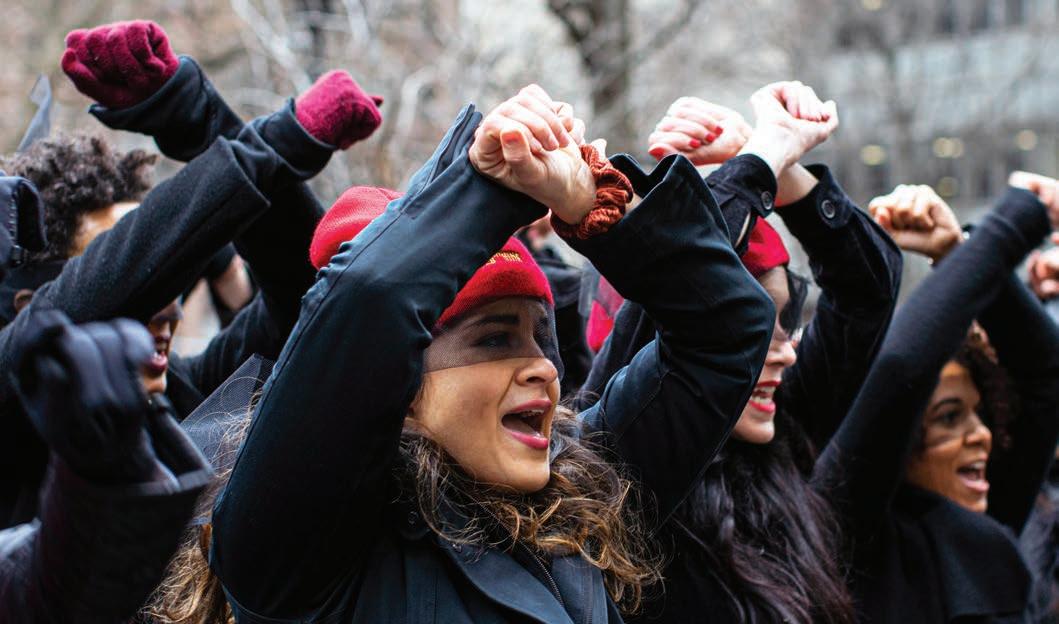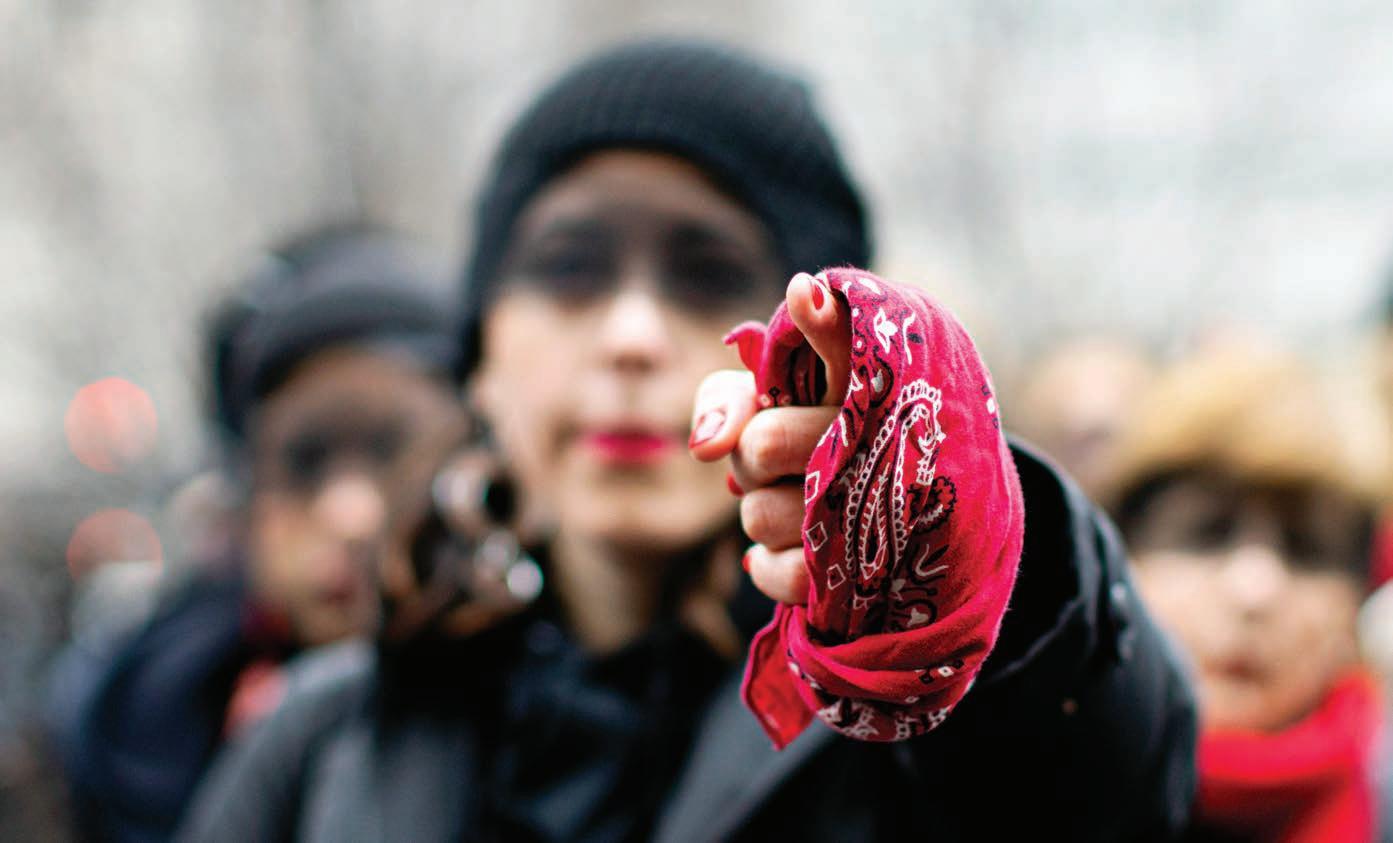
30 minute read
NEWS KIOSKO
"THEY WANTED TO ERASE MY REPORT COMPLETELY": UN RAPPORTEUR ON THE GOVERNMENT SEMANA COLOMBIA
Michel Forst, the UN special rapporteur on the situation of human rights defenders presented a report to the Colombian government that was categorically vetoed. Semana interviews him exclusively about the focus of the report he presented, the conditions faced by rights defenders in Colombia, and the government's reaction. "It is simple, every person who peacefully defends human rights is a defender and the state must protect them. It does not matter what the profession, age, ethnicity or social class is. Every person can become a human rights defender." Michel Forst, relator especial de la ONU sobre la situación de los defensores de los derechos humanos presentó al gobierno colombiano un informe que fue categóricamente vetado. Semana lo entrevista en exclusiva sobre el enfoque del informe que presentó, las condiciones que enfrentan los defensores de derechos en Colombia y la reacción del gobierno. "Es simple, toda persona que defiende de manera pacífica los derechos humanos es un defensor y el Estado la debe proteger. No importa el oficio, la edad, el origen étnico o la clase social. Cada persona puede convertirse en defensora de derechos humanos".
Advertisement
https://www.semana.com/nacion/articulo/michel-forst-relator-de-la-onu-habla-del-desaire-del-gobierno-colombiano/654179
"A WATER CACIQUE IN THE MAYAN PARADISE" CONNECTAS MÉXICO
Alfonso Romo Garza is an important Mexican businessman and, above all, he is the Head of the Oce of the President of the Republic, the right-hand man of President Andrés Manuel López Obrador. This collaborative investigation between Aristegui, Univision, Proceso, Ruidoenlared, VICE and Connectas shows the irregularities through which Romo has exploited the underground water reserves in Yucatan on which 2/3 of the country's renewable water depends. "Environmental damage on the Yucatan Peninsula led the Federal Attorney's Oce for Environmental Protection (Profepa) to investigate in April 2018 a biotechnology mega-project founded by Alfonso Romo Garza, current chief of sta to President Andrés Manuel López Obrador. The inspectors found a 5,500-square-meter cenote that was covered with dirt, rocks and debris and turned into nothing but mud." Alfonso Romo Garza es un importante empresario mexicano y, sobre todo, es el Jefe de la Oficina de la Presidencia de la República, mano derecha del presidente Andrés Manuel López Obrador. Esta investigación colaborativa entre Aristegui, Univisión, Proceso, Ruidoenlared, VICE y Connectas muestra las irregularidades por medio de las cuales Romo ha explotado las reservas subterráneas de agua en Yucatán de las que dependen 2/3 del agua renovable del país. "Un daño ambiental en la Península de Yucatán llevó a la Procuraduría Federal de Protección al Ambiente (Profepa) a investigar en abril del 2018 un megaproyecto de biotecnología fundado por Alfonso Romo Garza, actual jefe de gabinete del presidente Andrés Manuel López Obrador. Los inspectores encontraron un cenote de 5,500 metros cuadrados que fue tapado con tierra, rocas y despalme y convertido en solo fango".

https://www.connectas.org/especiales/un-cacique-del-agua-en-el-paraiso-maya/
"BEING A TRANS WOMAN IN GUATEMALA: 'I FOUND THE COURAGE TO BE MYSELF'" NÓMADA GUATEMALA

Fatima Medina understood her trans identity at the age of 9 and from the age of 15 she began fighting against all odds to be recognized and accepted by all as a woman. This is a profile in honor of the feminine diversity in Guatemala and our entire continent. "- Were you afraid? - Very much so. A lot of fear. I was scared. But I wanted to be me, I wanted to be independent. My father and mother did not accept me, they beat me, they left me all bruised and that's where all my courage came from. I got the courage to be myself and accept myself." Fátima Medina entendió su identidad trans a los 9 años y desde los 15 empezó a luchar contra viento y marea para ser reconocida y aceptada por todos como mujer. Este es un perfil en honor a la diversidad femenina en Guatemala y todo nuestro continente. "— ¿Tuviste miedo? — Miedo, mucho. Mucho temor. Estaba asustada. Pero quería ser yo, quería independizarme. Mi papá y mi mamá no me aceptaban, me pegaban, me dejaban toda morada y de ahí salió todo mi coraje. Me salió el valor para ser yo misma y aceptarme".
https://nomada.gt/nosotras/somos-todas/ser-mujer-trans-en-guatemala-me-salio-el-valor-para-ser-yo-misma/
While the world is panicking about COVID-19, there is another disease that is plaguing Latin America without raising so many voices of alarm: dengue fever. "Tambopata, in Madre de Dios, is the Peruvian jungle district most aected by dengue, with 2,224 cases. Reports extend to Loreto and San Martin. Due to the magnitude of the outbreak, the State has declared a health emergency. In these three regions alone, 7,857 cases were recorded in the first two months of the year." Mientras el mundo entre en pánico por el COVID-19, hay otra enfermedad que está azotando América Latina sin elevar tantas voces de alarma: el dengue. "Tambopata, en Madre de Dios, es el distrito de la selva peruana más afectado por el dengue con 2.224 casos. Los reportes se extienden a Loreto y San Martín. Debido a la magnitud del brote, el Estado ha declarado la emergencia sanitaria. Solo en estas tres regiones se registraron 7.857 casos en los dos primeros meses del año". "DENGUE FEVER HITS THE MOST VULNERABLE HEART IN THE PERUVIAN AMAZON" OJO PÚBLICO PERÚ

¿Lleno el censo o no lleno el censo? ¿Quiero un mejor futuro para mi familia o no lo quiero?
Llenar el censo es así de importante. Hazlo hoy mismo desde la privacidad de tu computadora, por teléfono o por correo y asegúrate de incluir a niños y adultos mayores. Tus respuestas al censo están protegidas y por ley nadie puede compartir tu información personal. ¡El censo ya llegó!
Llena el censo por internet hoy: 2020CENSUS.GOV/es
Pagado por la Oficina del Censo de los EE. UU.
STORY COVER
LATIN AMERICA GREW TIRED OF GENDER VIOLENCE AND TOOK TO THE STREETS ASKING FOR EQUALITY AND THE FUNDAMENTAL RIGHT TO BE ALIVE. AMÉRICA LATINA SE CANSÓ DE LA VIOLENCIA DE GÉNERO Y SALIÓ A LAS CALLES PIDIENDO IGUALDAD Y EL DERECHO FUNDAMENTAL A ESTAR VIVO. “¡NI UNA MENOS!” “¡NI UNA MENOS!”










By | Por: ANA MARÍA ENCISO NOGUERA AL DÍA News Content Producer anamariae@aldianews.com TRANSLATION | TRADUCCIÓN: MARTHA BIANCHI




This chorus was perhaps the most powerful verse that Latin American women gave to the world last year, after the Chilean group LasTesis presented their performance “Un violador en tu camino” (A rapist in your path).
We are starting Women’s History Month talking about the manifesto with which the continent shouted “¡Basta Ya!” (Enough is enough!), which it had been swallowing for decades.
The way in which the choreography and chorus were repeated by thousands of women throughout the world revealed the so frequently dismissed issue of femicide, and sparked a surge of feminist encounters and protests.
Contrasting with the continental roar for a change in public policies and cultural changes in favor of women’s lives, during the last months we have witnessed huge blunders from Latin American political leaders, evidencing an enormous lack of sensitivity, if not interest, on the matter: at the beginning of February, Ecuador’s president Lenin Moreno publicly stated that men are permanently submitted to the danger of being accused of harassment, especially if they’re ugly. ENGLISH




Ese estribillo tal vez sea la estrofa más potente que las mujeres latinoamericanas le regalaron al mundo el año pasado luego de que el colectivo chileno LasTesis diera a conocer su performance “Un violador en tu camino”.
La manera en que la coreografía y el coro fueron repetidos por miles de mujeres a lo largo y ancho del globo puso en evidencia el problema del feminicidio, con tanta frecuencia desestimado, y desató una oleada de encuentros y manifestaciones feministas.
Damos inicio al Mes de la Mujer hablando del manifi esto que permitió al continente gritar un “¡Basta Ya!” atragantado durante décadas.
En contraste al rugido continental por el cambio de políticas públicas y cambios culturales en favor de la vida de las mujeres, en los últimos meses hemos visto enormes desaciertos de dirigentes políticos latinoamericanos, en los que evidencian una enorme falta de sensibilidad, por no decir interés, en el tema: a inicios de febrero, el presidente ecuatoriano Lenin Moreno afi rmó en un acto público que los hombres están permanentemente sometidos al peligro de ser acusados de acoso, especialmente si son feos. ESPAÑOL
Women sing "El Violador Eres Tú" ("The Rapist Is You,") an anthem created by the Chilean feminist collective Las Tesis, in Times Square during the annual Women's March on January 18, 2020 in New York City. . Photo by Yana Paskova/Getty Image


Las mujeres cantan "El Violador Eres Tú", un himno creado por el colectivo feminista chileno Las Tesis, en Times Square durante la Marcha Anual de las Mujeres el 18 de enero de 2020 en la ciudad de Nueva York. . Foto de Yana Paskova/Getty Image

February 21 marked the beginning of a crisis for the Administration of Andrés Manuel López Obrador in Mexico, who, after attributing the assassination of Fátima –plainly, as her case has been made public– to the moral degradation caused by the neoliberal model, asked that those protesting outside the National Palace –his residence– not to paint the doors. And, finally, he seems to have discouraged Beatriz Gutiérrez Müller, the First Lady, from participating in the National Women’s Strike, organized by the collective Las Brujas del Mar, from Veracruz, scheduled for March 9.
While political leaders appear to be nonchalant and public policy equally indifferent, in Latin America the feminist groups are increasingly gaining visibility in the fight for our rights and are speaking out more so that we are respected on the most elemental of principles: that we are not assassinated solely because we are women. ENGLISH
El 21 de febrero empezó una crisis para el gobierno de Andrés Manuel López Obrador, en México, que luego de adjudicar el asesinato de Fátima –a secas, como se ha divulgado su caso– a la degradación moral causada por el modelo neoliberal, pidió que las protestantes afuera del Palacio Nacional, donde reside, no le pintaran las puertas y, finalmente, parece haber disuadido a Beatriz Gutiérrez Müller, la primera dama, de participar en el Paro Nacional de Mujeres, convocado por el colectivo Las Brujas del Mar, de Veracruz, para el 9 de marzo.
Mientras los líderes políticos se muestran indolentes y la política pública igualmente indiferente, en América Latina los colectivos feministas están cobrando cada vez más visibilidad en la lucha por nuestros derechos y cada vez están alzando más la voz para que se nos respete desde el más elemental de los principios: no ser asesinadas por el simple hecho de ser mujeres. ESPAÑOL
A RAPIST IN YOUR PATH
Imagine walking by a plaza, a park or the stairs of a large building and finding dozens of blindfolded women expressing sheer determination. After a moment of silence, a bass drum begins to set the beat to which they will sing.
UN VIOLADOR EN TU CAMINO
Imaginen pasar por una plaza, un parque o las escaleras de un gran edificio y encontrar decenas de mujeres con los ojos vendados y expresión de determinación absoluta. Tras un momento de silencio, un bombo empieza a marcar el ritmo con que ellas van a cantar
De acuerdo a datos publicados por Naciones Unidas el 24 de noviembre de 2019, una de cada tres mujeres es víctima de abuso físico sexual en algún momento de la vida. According to data released by the United Nations on November 24, 2019, one out of three women is a victim of sexual physical abuse at some time in her life.
El patriarcado es un juez que nos juzga por nacer, y nuestro castigo es la violencia que no ves. (Patriarchy is a judge That judges us for being born, And our punishment Is the violence you do not see)
Women protest against rape as they sing a song in front of the court while Harvey Weinstein attends a pretrial session on January 10, 2020 in New York City. Photo by Kena Betancur/Getty Images

El patriarcado es un juez que nos juzga por nacer, y nuestro castigo es la violencia que ya ves. (Patriarchy is a judge That judges us for being born, And our punishment Is the violence you now see)
Es femicidio. Impunidad para mi asesino. Es la desaparición. Es la violación. (It is femicide Impunity for my murderer It is disappearance It is rape).
Y la culpa no era mía, ni dónde estaba ni cómo vestía. El violador eras tú. El violador eres tú. (And it wasn't my fault, or where I was or how I dressed. You were the rapist. You are the rapist.)
Women sing "El Violador Eres Tú" ("The Rapist Is You,") an anthem created by the Chilean feminist collective Las Tesis, in Times Square after walking in the annual Women's March on January 18, 2020 in New York City. Photo by Yana Paskova/Getty Images)
Las mujeres cantan "El Violador Eres Tú", un himno creado por el colectivo feminista chileno Las Tesis, en Times Square después de caminar en la Marcha Anual de las Mujeres el 18 de enero de 2020 en la ciudad de Nueva York.. Foto de Yana Paskova/Getty Images)
This performance was designed by Dafne Valdés, Paula Cometa, Sibila Sotomayor and Lea Cáceres, who make up LasTesis. Their objective was to take the thesis of feminism, especially those of Argentine Anthropologist Rita Segato, to the performance level.
Two of Segato’s ideas stand out when we see the videos of these fierce women, time and time again:
The first is the conclusion Segato reached while working with rapists in Brazilian jails: Rape is not a crime perpetrated by an erotic interest, but as an exercise of moralizing power. It is a person that wants to correct the behavior of another.
The other equally shocking idea is that when a crime is committed against a man, this seems to be seen as a crime against humanity as a whole, while crimes against women tend to be construed as crimes relating to intimacy, erotism, and are therefore “lesser and unique crimes” –things that take place in small spaces to isolated individuals, which is untrue.
“The blindfolds seem to remove women’s fear of social evaluation, submitting themselves to the gazes and judgements of others [...] The dance gives us a sense of embracing life, of the decision to enjoy it and freeing ourselves of the guilt placed

ENGLISH
on us. However, there is also deep pain, even some wrath, present”, recalls Luisa María Zorrilla, who participated on November 30 in Bogota, where they carried signs with the names of 238 women who had been assassinated in Colombia during that year. “Seeing the names of so many who have been abused and violated produces a sensation of repudiation and contempt towards all those attitudes legitimizing those who have stripped away someone’s dignity at any time,” she added. “A Rapist in Your Path” has been reproduced in Santiago de Chile, Paris, Bogota, Medellín, Madrid, Barcelona, Berlin and Mexico City, among many other cities. The crowd of women confronting the public contradicts the idea that the victim is isolated and alone; the way that they hold the State, as much as the police and individuals responsible shows direct and structur
MARCH 11 - 18, 2020 ESPAÑOL
Este performance fue diseñado por Dafne Valdés, Paula Cometa, Sibila Sotomayor y Lea Cáceres, que conforman LasTesis. Su objetivo era llevar al nivel performático las tesis del feminismo, especialmente de la antropóloga argentina Rita Segato.
Dos de las ideas de Segato llaman la atención, al ver una y otra vez los videos de estas mujeres fieras, la primera es una conclusión a la que llegó Segato trabajando con violadores en cárceles brasileñas: la violación no es un crimen que se perpetre por un interés erótico, sino como un ejercicio de poder moralizante. Es una persona que quiere corregir la conducta de otra. La otra idea, igualmente chocante, es que cuando se comete un crimen contra un hombre éste tiende a ser visto como un crimen contra la humanidad entera, mientras que los crímenes contra las mujeres suelen ser interpretados como crímenes relativos al ámbito de lo íntimo, del erotismo, y por eso son “crímenes menores” y singulares. Son cosas que pasan en espacios pequeños personas aisladas, lo que es falso. “Las bandas en los ojos parece que le quitaran a las mujeres el miedo a la evaluación social, el someterse a las miradas y juicios de los otros [...]. El baile hace sentir que se abraza a la vida, que se decide disfrutarla al liberarse de las culpas que nos ponen. Pero también hay un dolor profundo, incluso algo de ira”, recuerda Luisa María que participó en Bogotá el 30 de noviembre, donde llevaron letreros con los nombres de 238 mujeres que han sido asesinadas en Colombia durante este año. “Ver los nombres de tantas que han agredido y violentado no deja de producir una sensación de repudio y desprecio hacia todas esas actitudes que legitiman a quienes nos han quitado la dignidad en algún momento," agregó.
“Un violador en tu camino” ha sido replicado en Santiago de Chile, París, Bogotá, Medellín, Madrid, Barcelona, Berlín y Ciudad de México. La multitud de mujeres que confronta al público contradice la idea de que la víctima está sola y aislada y la manera en que responsabiliza tanto al Estado como a la policía e individuos muestra formas de violencia directa y estructural, mientras que las estrofas “y la culpa no era mía, ni dónde estaba ni cómo vestía” apuntan a elementos de violencia cultural contra la mujer .
Lamentablemente, la violencia de género está muy lejos de ser un hecho aislado, que se limite a escaso ámbitos privados. Tampoco obedece a barreras geográficas ni poblacionales.
De acuerdo a datos publicados por Naciones Unidas el 24 de noviembre de 2019, una de cada tres mujeres es víctima de abuso físico sexual en algún momento de la vida. Esta es una problemática que afecta tanto a Latinoamérica como a los Estados Unidos. En Estados Unidos, por ejemplo, un estudio publicado por la Organización Mundial de la Salud encontró que el 70% de las mujeres ha sufrido abuso físico y/o sexual por parte de un compañero íntimo.
Este tipo de performance reúne a las mujeres, rompe el aislamiento que recubre a las víctimas de violencia de género y visibiliza un problema que, lejos de ser una agresión aislada e individual, afecta a la humanidad entera.

Women protest against rape as they sing a song in front of the court while Harvey Weinstein attends a pretrial session on January 10, 2020 in New York City. . Photo by Kena Betancur/Getty Images
Las mujeres protestan contra la violación mientras cantan una canción frente al tribunal mientras Harvey Weinstein asiste a una sesión previa al juicio el 10 de enero de 2020 en la ciudad de Nueva York. . Foto de Kena Betancur/Getty Images
ENGLISH ESPAÑOL
al forms of violence, while the chorus line “y la culpa no era mía, ni dónde estaba ni cómo vestía” (And it wasn't my fault, or where I was or how I dressed. You were the rapist. You are the rapist) points towards elements of cultural violence against women.
Unfortunately, gender violence is far from being an isolated event, limited to scant private spheres. It also does not obey geographical or demographic barriers.
According to data released by the United Nations on November 24, 2019, one out of three women is a victim of sexual physical abuse at some time in her life. This is a problem affecting both Latin America and the US. In the US, for example, a study published by the World Health Organization (WHO) found that 70% of the women
18 • had suffered physical and/or sexual abuse by their intimate partner.
This type of performance gathers women, brings down the walls of isolation that covers the victims of gender violence and visibilizes the problem that, far from being an isolated and individual assault, affects all humanity.
AND IF THERE WEREN’T ANY WOMEN?
According to Mexico’s National Human Rights Commission, the number of women assassinated each day has increased continuously since 2015. According to its estimates, during the first nine months of 2019, 10.5 women were assassinated each day, compared to 6.5 in 2015. Of the 2,833 cases that occurred between January and September 2019, 729 were recorded as femicides and 2,107 as intentional homicides for causes unrelated to gender.
Mexico’s security situation is highly problematic both due to cultural factors and the growing drug traffic cartels, that attack both men and women.
Of the dozens of assassinations of women that have taken place in Mexico to date, two of them have shaken the population: that of Isabel Cabanillas, a feminist artist and activist, and that of Fátima, a 7 year old girl. Both cases led citizens, above all women’s groups, to take to the streets. After days of mobilizing because of the assassination of the little girl, after the frustration felt from the insufficient responses from the President who, aside from “covering” her death with the
¿Y SI NO HUBIERA MUJERES?
De acuerdo a la Comisión Nacional de Derechos Humanos de México, el número de mujeres asesinadas al día ha aumentado continuamente desde el 2015. Se gún sus cálculos, durante los primeros nueve meses del 2019 fueron asesinadas 10,5 mujeres al día, en contraste con 6,5 en 2015. De los 2.833 casos ocurridos entre enero y septiembre de 2019, 726 fueron registrados como feminicidios y 2.107 como homicidios dolosos por causas no relativas al género.
La situación de seguridad en México es altamente problemática tanto por factores culturales como por el crecimiento de los carteles de tráfico de drogas, que atacan tanto a hombres como a mujeres. De las decenas de asesinatos de mujeres que ya han ocurrido en México para este momento del año, dos de ellos en particular han sacudido a la población: el de Isabel Cabanillas, una artista y activista feminista, y el de Fátima, una niña de 7 años. Ambos casos volcaron la población a las calles, particularmente a los colectivos de mujeres y, tras días de movilizaciones por el asesinato de la niña, tras la frustración de las respuestas insuficientes del presidente, que aparte de apañar su muerte a la decadencia provocada por el neoliberalismo, no ha planteado estrategias concretas de protección a la mujeres y prevención de los ataques, tras todo esto salió la duda: ya que nos están acabando, ¿qué pasaría si no estuviéramos? Esta fue la pregunta que planteó el colectivo Las Brujas del Mar, a la que resolvieron responder con un Paro Nacional de Mujeres convocado para el 9 de marzo. “¿No nos cuidan? ¿Les da igual si existimos o no? Pues
En América Latina los colectivos feministas están cobrando cada vez más visibilidad en la lucha por nuestros derechos y cada vez están alzando más la voz. In Latin America the feminist groups are increasingly gaining visibility in the fight for our rights and are speaking out more.
decadence caused by neoliberalism, has not provided concrete strategies to protect women and prevention measures for the attacks… After all of this, the question emerged: Since they are wiping us out, what would happen if we were gone?
This question was raised by the group Las Brujas del Mar, which they decided to reply to with a National Women’s Strike convened for March 9.
“They don’t take care of us? They don’t care if we do or don’t exist? Well, look at what it would be like if we were no longer here! No girls going to school, no women teachers, no women on the street, don’t go to work, don’t go to the supermarket, don’t leave home.”
This initiative has been backed by at least 16 news organizations, Televisa and El Heraldo among them; 69 educational institutions, including UNAM and Tecnológico de Monterrey; 42 state and federal institutions, such as the Departments of the Interior, Federal Health, Culture, Environment and Natural
ENGLISH ESPAÑOL
Resources, National Defense and the Marines, the Mexican Senate, the Lower House, Walmart Mexico, Mercadolibre, Deli, BBVA Mexico, Grupo Bimbo, Coca Cola, Scotiabank, Discovery, Grupo Santander and Warner Music Mexico.
Among many other public life leaders, Beatriz Gutiérrez Müller, wife of Andrés Manuel López Obrador and the First Lady, quickly backed the strike on her social media, only to post opposing advertising a few hours later. This has given rise to various voices of alarm and protest, for it is obvious that the First Lady was forced to recant by the Head of State.
With or without the First Lady, Mexican women are determined to make themselves felt, for their peers, co-citizens and rulers to feel the impacts of their absence, for them to understand that we want ourselves alive and that in inhabiting the same world, we need them in order to achieve this. miren cómo sería ¡si no existiéramos más! No niñas a las escuelas, no maestras, no mujeres en la calle, no vayas a tu trabajo, no vayas al super, no salgas ni a la esquina”.
Esta iniciativa ha sido respaldada, por lo menos, por 16 medios de comunicación, Televisa y El Heraldo entre ellos; 69 instituciones educativas, contando la UNAM y el Tecnológico de Monterrey, 42 instituciones estatales y federales, como las Secretarías de Gobernación, Salud Federal, Cultura, Medio Ambiente y Recursos Naturales, Defensa Nacional y de la Marina, el Senado de México, la Cámara de Diputados, el Gobierno del Estado de México, el Consejo de la Judicatura Federal, el Poder Judicial de la Federación y la Corte Supre

ma de Justicia; y 44 empresas y bancos, entre ellos Google México, Penguin Random House, Walmart de México, Mercado Libre, Dell, BBVA México, el Grupo Bimbo, Coca Cola, Scotiabank, Discovery, el Grupo Santander y Warner Music México.
Entre otros muchos referentes de la vida pública, Beatriz Gutiérrez Müller, la esposa de Andrés Manuel López Obrado y primera dama de la nación, rápidamente respaldó el paro a través de sus redes sociales, para publicar una publicidad contraria unas horas después. Esto ha elevado múltiples voces de protesta y alarma, pues a todas luces se entiende que la primera dama fue obligada por el primer mandatario a retractarse.
Con la primera dama o sin ella, las mujeres mexicanas están resueltas a hacerse sentir, a que sus compañeros, conciudadanos y gobernantes sientan los impactos de su ausencia, a que entiendan que vivas nos queremos y al habitar el mismo mundo, necesitamos de ellos para conseguirlo.
Women sing "El Violador Eres Tú" ("The Rapist Is You,") an anthem created by the Chilean feminist collective Las Tesis, in Times Square during the annual Women's March on January 18, 2020 in New York City. Photo by Yana Paskova/Getty Images
Las mujeres cantan "El Violador Eres Tú", un himno creado por el colectivo feminista chileno Las Tesis, en Times Square durante la Marcha Anual de las Mujeres el 18 de enero de 2020 en la ciudad de Nueva York... Foto de Yana Paskova/Getty Images
CULTURA
Maluma performs at Madison Square Garden on October 04, 2019 in New York City. Photo by Theo Wargo/Getty Images

MEXICO VS. REGGAETON Maluma se presenta en el Madison Square Garden el 04 de octubre de 2019 en la ciudad de Nueva York. Foto de Theo Wargo/Getty Images A SOLUTION AGAINST FEMINICIDE?
MORE THAN 80% OF THE SONGS IN REGGAETON EXPLICITLY INCITE GENDER-BASED VIOLENCE.
MÁS DE UN 80% DE LAS CANCIONES DE ESTE GÉNERO MUSICAL INCITAN EXPLÍCITAMENTE A LA VIOLENCIA DE GÉNERO.
Extreme situations require extreme measures, said the Vice President of the Mexican Senate, Salomón Jara, who yesterday presented a proposal to reform the Federal Law on Radio and Television to prohibit the broadcast of programs and series that encourage gender stereotypes and use sexist language.
This includes the musical genre of reggaeton, which according to a study conducted by the University of Chile, transmits a message of gender violence in 80% of its songs.
"It is not a question of censorship," said the senator, "but of authority applying the law: guar
ENGLISH
anteeing women a life free of all types of violence."
Jara pointed out that while some propose an "inefficient criminal populism", the way out of the crisis of violence must be another route:
"We propose a break and a change of paradigm that redefines the standardized patriarchal structures and forces the state to assume the responsibilities that previous regimes renounced," he said.
Situaciones extremas requieren medidas extremas, lo aseguró el vicepresidente del Senado mexicano, Salomón Jara, que ayer presentó una propuesta de reforma a la Ley Federal de Radio y Televisión para prohibir la emisión de programas y series que incentiven los estereotipos de género y utilicen un lenguaje machista. Lo que incluye el género musical del reggaetón, que según un estudio dirigido por la Universidad de Chile transmite un mensaje de violencia de género en un 80% de sus canciones.
“No se trata de censurar -dijo el senador-, sino de que la autoridad aplique la ley: garantizar a las mujeres una vida libre de todo tipo de violencia”. ESPAÑOL
Jara señaló que mientras unos proponen un “ineficiente populismo penal”, la salida a esta crisis de violencia debe ser otra: “Nosotros proponemos una ruptura y un cambio de paradigma que redefina las estructuras patriarcales normalizadas y que obligue al Estado a asumir las responsabilidades a las que renunciaron regímenes anteriores”, aseguró.
La medida aún iría más lejos, imponiendo multas a los
The measure would go even further, imposing fines on programmers equivalent to 2.51% and up to 5% of income if they persist in giving free reign to messages, expressions or content that promote male violence.
During the announcement of the proposal, Salomón Jara cited the study Gender violence in reggaeton, carried out by the University of Chile, which found in 59 of 70 songs surveyed, there were more than 568 violent and hateful references to women, whether physical, psychological or symbolic.
"Among the representatives of the genre, the most violent was Maluma with his song "Cuatro Babys", in which 44 mentions of violence were recorded," said the Mexican senator. "The disturbing thing about these messages is that they are not transmitted at 2 a.m. through restricted media, but rather we hear them on the radio and on television during triple-A hours (for all publics)." "This is what your sons and daughters, my daughters and granddaughters, the children of all Mexico are exposed to," he concluded.
A NON-MACHISTA REGGAETON? Although the race to end gender violence is wreaking havoc in Mexico - last year alone there were 976 femicides in the country - according to the Mexico City Human Rights Commission, the causes are multiple and are due to a cultural context of misogyny and machismo that is deeply rooted, but also to social, economic and political problems such as criminal impunity and poverty.
This leads us to reflect on whether these prohibitive measures are not a path to greater evil and whether they should be accompanied by greater efforts to educate citizens about equality. Besides, excessive protectionism could lead to the infantilization of adults and yes, to the repression of an artistic manifestation as happens with narcocorrido, which Jara has not mentioned.
Likewise, there are great reggaeton artists who have made feminism and inclusive messages one of their best assets, such as the Puerto Rican Bad Bunny who, after being accused of the opposite, threw himself into using the powerful reggaeton sounds to the contrary.
"We don't want one more death. Less violence and more perreo," the artist wrote on his Instagram account.
Maybe it's about making visible those in the mainstream that send a message of social consciousness instead of gagging those who set the wrong example.
programadores por el equivalente de un 2,51% a un 5% de los ingresos si persisten en dar vía libre en medios públicos a mensajes, expresiones o contenidos que promuevan la violencia machista.
Durante el anuncio de esta propuesta, Salomón Jara citó el estudio “Violencia de género en el reggaetón”, realizado por la Universidad de Chile, que detectó que en al menos 59 de 70 canciones había más de 568 referencias violentas y de odio contra la mujer, bien sea física, psicológica o simbólica.
“De entre los representantes del género, el más violento fue Maluma con su canción “Cuatro Babys”, en la que se registraron 44 menciones de violencia -dijo el senador mexicano-. Lo perturbador de estos mensajes es que no se transmiten a las 2 de la madrugada a través de medios restringidos, sino que lo escuchamos en la radio y en televisión en horario triple A (para todos los públicos)”.
“Es a lo que están expuestos sus hijos e hijas, mis hijas y nieta, las y los niños de todo México”, concluyó.
¿EXISTE UN REGGAETÓN NO MACHISTA?
Si bien la carrera para acabar con la violencia de género que está causando estragos en México -solo el pasado año hubo 976 feminicidios en el país, que es su consecuencia más extrema-, según reporta La Comisión de los Derechos Humanos del DF, las causas son múltiples y obedecen a un contexto de misoginia y machismo muy arraigado, pero también a problemas sociales, económicos y políticos como la impunidad criminal y la situación de pobreza.
Lo que nos lleva a reflexionar sobre si estas medidas prohibitivas no son un parche para un mal mayor y si deberían ir acompañadas de mayores esfuerzos para educar a la ciudadanía en la igualdad. Además de incurrir en el peligro de que un excesivo proteccionismo pueda llevar a la infantilización de los adultos y sí, a la represión de una manifestación artística como ocurre con el narcocorrido, al que Jara no ha hecho mención.
Asimismo, existen grandes artistas de reggaetón que han hecho del feminismo y los mensajes inclusivos una de sus mejores bazas, como el puertorriqueño Bad Bunny que, tras ser acusado por algunas colaboraciones desafortunadas, se lanzó a utilizar los potentes sonidos reggaetoneros para lo contrario.
“No queremos ni una muerte más. Menos violencia y más perreo”, escribió el artista en su cuenta de Instagram.
Tal vez consista en visibilizar a quienes intentan desde el mainstream mandar un mensaje de conciencia social en lugar de amordazar a quienes dan el ejemplo equivocado.
En al menos 59 de 70 canciones había más de 568 referencias violentas y de odio contra la mujer. In 59 of 70 songs surveyed, there were more than 568 violent and hateful references to women.
CULTURA OUR PRINT EDITION? DO YOU LIKE YOUR OPINION IS IMPORTANT TO US Tell us your opinion! Write to us at print@aldianews.com OUR PRINT EDITION? DO YOU LIKE OUR PRINT EDITION? DO YOU LIKE YOUR OPINION IS IMPORTANT TO US Tell us your opinion! Write to us at print@aldianews.com OUR PRINT EDITION? DO YOU LIKE
YOUR OPINION IS IMPORTANT TO US Tell us your opinion! Write to us at print@aldianews.com FOLLOW US AT@ News YOUR OPINION IS IMPORTANT TO US Tell us your opinion! Write to us at print@aldianews.com FOLLOW US AT@ News
OPEN HOUSE Main Campus FOLLOW US AT@ FOLLOW US AT@










